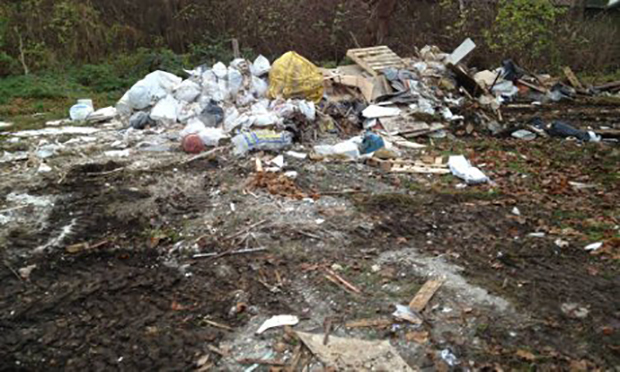Liberal Democrat activists accuse Town Hall of ‘completely losing control’ of fly-tipping

Hackney’s Liberal Democrats have accused the Town Hall of “completely losing control” of fly-tipping in the borough.
The council admitted back in January to losing track of the rates of illegally dumped waste in the borough for a whole year, after quizzing from the Citizenover why the numbers of incidents increased from 3,267 in 2016/17 to 9,821 in 17/18.
The Hackney Post was told in a council response to its own reporting on the issue that the rise was in part down to incidents on estates being recorded for the first time, as well as appearing worse than it was due to the lack of data collected in 16/17 after a restructure of the environmental services department.
However, in responses to Freedom of Information requests made by the Lib Dems, council data says that only 60 incidents were recorded from estates only in 2017/18, far less than would account for a rise of thousands.
Confusingly, the council response goes on to say that waste collection crews do not currently record whether a fly-tip is from an estate or not “to keep the collections as efficient as possible but also because the crews are not always able to tell where the boundary of an estate is”.
Darren Martin, vice-chair of Hackney Liberal Democrats, said: “It’s hard to think of why the council would offer 60 recorded incidents of fly-tipping on estates as a reason for an increase of thousands.
“It seems they did not expect the numbers to be followed up.
“They seem completely unsure of whether or not they actually record incidents on estates or not.
“It seems the council has completely lost control of this important community issue.”
It is understood the council intends to develop a data collection system to more accurately map the locations of fly-tips, including the ability to tell whether or not they fall within an estate.
The Liberal Democrats are continuing to blame the rise of fly-tipping rates on the council’s bulky waste charge, introduced in 2017, and called on the Town Hall to scrap it.
The apparent rise in fly-tipping rates appears to correlate with the introduction of the charge, though a recent BBC investigation found no connection between the areas with the highest charges for waste collection and the highest rates of fly-tipping.
However, as the Town Hall has said that the figures for 16/17 are not to be trusted in any case, it remains unclear what the true picture of fly-tipping in the borough is.
Hackney Council was approached for comment but had not responded by time of going to press.
A Hackney Council spokesperson said: “As Hackney residents will know, our streets are some of the cleanest in the capital. This is because introducing the bulky waste charge has helped us to protect front line services like street cleansing at a time when our funding from government has been cut by half since 2010.
“All reported fly tips are collected on the same day, often within a few hours, and, where there is evidence, we take enforcement action against those responsible for fly tipping – including most recently against a business fined over £8,000 for repeatedly fly tipping.
“Since bulky waste charges were introduced in 2017, our crews have not reported an increase in the amount of fly-tipping they are collecting and we haven’t put any extra resources into collecting fly tipping. The increase in the number of incidents since 2015 simply reflects the amalgamation of our street cleansing service with our estate teams, who previously did not collect fly tipping data.
“27 out of the 32 London boroughs charged for bulky waste collections when we introduced our charge. Our charges are also some of the lowest in the country – just £15 for up to five large items – and collections are free for those living in council housing or in receipt of housing benefit.
“We will continue to review the impact of the bulky waste charge and report back on the findings.”
EDIT: This article was updated at 7:52 on 24 August to include a response from Hackney Council.
